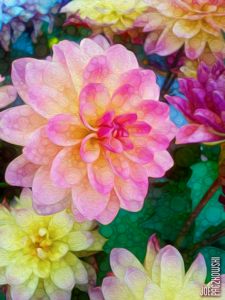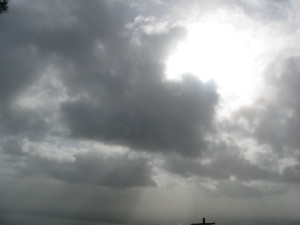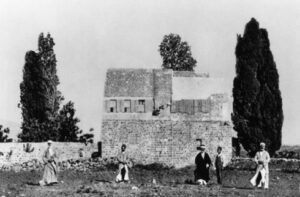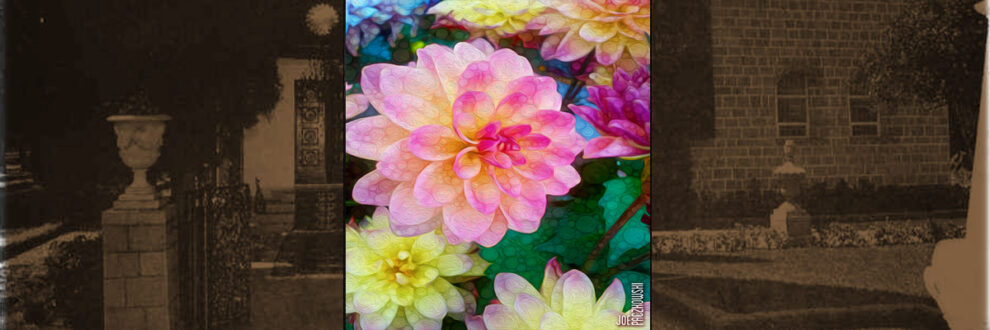 Ḥájí Mullá Mihdí-i-Yazdí
Ḥájí Mullá Mihdí-i-Yazdí
Born: Approximate 1830
Death: 1878/1879
Place of Birth: Yazd, Iran
Location of Death: (Mazra‘ih) Haifa, Israel
Burial Location: No cemetery details
Editor’s Note: Haji Mulla Mihdi-i-‘Atri, was known for his expertise in making rose-water and attar of rose, and hence the last name, Atri, meaning the perfume-maker. Ziyarat-Namih-i Haji Mulla Mihdiy-i `Atri (Tablet of Visitation for the father of Varqa; The Revelation of Bahá’u’lláh Volume 4 p. 51). [Mihdi-i sometimes spelled Mihdiy-i]
Yet another who left his homeland was Mullá Mihdí of Yazd. Although to all appearances this excellent man was not of the learned class, he was an expert in the field of Muslim sacred traditions and an eloquent interpreter of orally transmitted texts. Persevering in his devotions, known for holy practices and nightly communings and vigils, his heart was illumined, and he was spiritual of mind and soul. He spent most of his time repeating communes, performing the obligatory prayers, confessing his failings and supplicating the Lord. He was one of those who penetrate mysteries, and was a confidant of the righteous. As a teacher of the Faith he was never at a loss for words, forgetting, as he taught, all restraint, pouring forth one upon another sacred traditions and texts.
 When news of him spread around the town and he was everywhere charged, by prince and pauper alike, with bearing this new name, he freely declared his adherence and on this account was publicly disgraced. Then the evil ‘ulamás of Yazd rose up, issuing a decree that he must die. Since the mujtahid, Mullá Báqir of Ardikán, refused to confirm the sentence of those dark divines, Mullá Mihdí lived on, but was forced to leave his native home. With his two sons, one the great martyr-to-be, Jináb-i-Varqá, and the other Jináb-i-Ḥusayn, he set out for the country of his Well-Beloved. In every town and village along the way, he ably spread the Faith, adducing clear arguments and proofs, quoting from and interpreting the sacred traditions and evident signs. He did not rest for a moment; everywhere he shed abroad the attar of the love of God, and diffused the sweet breathings of holiness. And he inspired the friends, making them eager to teach others in their turn, and to excel in knowledge.
When news of him spread around the town and he was everywhere charged, by prince and pauper alike, with bearing this new name, he freely declared his adherence and on this account was publicly disgraced. Then the evil ‘ulamás of Yazd rose up, issuing a decree that he must die. Since the mujtahid, Mullá Báqir of Ardikán, refused to confirm the sentence of those dark divines, Mullá Mihdí lived on, but was forced to leave his native home. With his two sons, one the great martyr-to-be, Jináb-i-Varqá, and the other Jináb-i-Ḥusayn, he set out for the country of his Well-Beloved. In every town and village along the way, he ably spread the Faith, adducing clear arguments and proofs, quoting from and interpreting the sacred traditions and evident signs. He did not rest for a moment; everywhere he shed abroad the attar of the love of God, and diffused the sweet breathings of holiness. And he inspired the friends, making them eager to teach others in their turn, and to excel in knowledge.
He was an eminent soul, with his heart fixed on the beauty of God. From the day he was first created and came into this world, he single-mindedly devoted all his efforts to acquiring grace for the day he should be born into the next. His heart was illumined, his mind spiritual, his soul aspiring, his destination Heaven. He was imprisoned along his way; and as he crossed the deserts and climbed and descended the mountain slopes he endured terrible, uncounted hardships. But the light of faith shone from his brow and in his breast the longing was aflame, and thus he joyously, gladly passed over the frontiers until at last he came to Beirut. In that city, ill, restive, his patience gone, he spent some days. His yearning grew, and his agitation was such that weak and sick as he was, he could wait no more.
He set out on foot for the house of Bahá’u’lláh. Because he lacked proper shoes for the  journey, his feet were bruised and torn; his sickness worsened; he could hardly move, but still he went on; somehow he reached the village of Mazra‘ih and here, close by the Mansion, he died. His heart found his Well-Beloved One, when he could bear the separation no more. Let lovers be warned by his story; let them know how he gambled away his life in his yearning after the Light of the World. May God give him to drink of a brimming cup in the everlasting gardens; in the Supreme Assemblage, may God shed upon his face rays of light. Upon him be the glory of the Lord. His sanctified tomb is in Mazra‘ih, beside ‘Akká.
journey, his feet were bruised and torn; his sickness worsened; he could hardly move, but still he went on; somehow he reached the village of Mazra‘ih and here, close by the Mansion, he died. His heart found his Well-Beloved One, when he could bear the separation no more. Let lovers be warned by his story; let them know how he gambled away his life in his yearning after the Light of the World. May God give him to drink of a brimming cup in the everlasting gardens; in the Supreme Assemblage, may God shed upon his face rays of light. Upon him be the glory of the Lord. His sanctified tomb is in Mazra‘ih, beside ‘Akká.
Source:
‘Abdu’l-Bahá. Memorials of the Faithful. Bahai.org.
Images:
(c) Baha’i Chronicles
Art Design by Joe Paczkowski
Mansion photos from http://www.bahaullah.org




